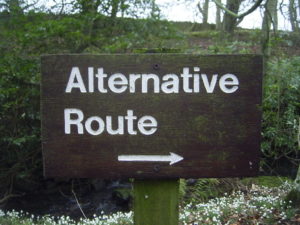Kimnach’s general introduction to Jonathan Edwards’s preaching in volume 10, The Works of Jonathan Edwards, contains fascinating information about Edwards’s sermon manuscripts. He summarizes:
“Edwards became a master of his inherited sermon form…” (p. 41, emphasis added).
This made me think about the sermon form that I “inherited” from those who modeled preaching for me and those who taught preaching to me. Take a moment to think about how you were formed into the kind of preacher you are. Who influenced the way you preach and the forms your sermons take?
Then, Kimnach writes, “…but in the 1730s, at the zenith of his mastery, he began experimenting artistically with the sermon. He apparently did everything he could do without actually abandoning the old form entirely, and the only possible conclusion one can draw from the manuscript evidence of his experiments is that he was searching, consciously or unconsciously, for a formal alternative to the sermon itself.” (p. 41, emphasis added).
I can relate to that.
From the early days of my training I have not been a fan of sermons. And now, closing in on having preached almost 2000 sermons, I am still not a fan of the traditional sermon form.
Through the years the form of my sermons have changed with the goal of trying to find out what works best for me with the gifts God has given me, including the people God has given to me.
How about you? Do you ever think about experimenting with some “formal alternative to the sermon itself”? If so, what might it be.
Of course, this kind of analysis begins with thinking about what aspects of the sermon might not be working as well as it could be. And, then, how might you change it? Is anything keeping you locked into your current form?
I am hoping that our Lord will continue to receive glory in the church and in Christ Jesus (Ephesians 3:21) as we continue to tinker with the task of communicating God’s on Sunday mornings in the most effective way possible.
Randal



Maybe we should ask ourselves the most important question first. What _is_ a sermon? I’m not entirely sure I know… I know what I’ve heard, what I’ve been taught, and what I’ve “preached” the past thirty years, but honestly, what is a sermon? 🙂
For myself, and I think I shared this before here, but years ago, as a young preacher I was working as a temp worker, and one of the guys I worked with, regardless of what anybody said, he’d retort, “what’s your point?” Over a couple days of listening to him say this, and finding myself feeling obliged to make my point to him, or reducing whatever it was we were talking about to that “point”–regardless of the discussion–I had a tiny “Eureka” moment. I imagined him pestering me like this while preaching, so, when I started working on sermons, in my mind, I’d let him pester me–what’s your point–throughout the process. It totally changed how I, as a young preacher, both prepared and preached my sermons, and improved them dramatically–one point, driven home, from start to finish.
Of course, preaching in Poland changed me more. I quickly discovered that the people to whom I was speaking had mostly never heard Bible teaching, hardly knew what the Bible was, why it existed, why it was important to speak about it, etc. And that changed my preaching yet again, and it is still evolving today, as you said…
and I’ve still never really thought about what exactly a sermon is, or what it’s truly supposed to be… weird…
Very weird, Jon, that we preachers have not figured out what a sermon is or supposed to be! I just remember early on not being satisfied with the sermon and felt like it wasn’t the best way to communicate God’s Word. I certainly think your tormentor was right about getting to the point. For the past couple of years or so I’ve focused my attention on being able to say in the introduction, after the public reading of Scripture: “This morning we worship by…” (filling in the blank with the intended response in the preaching portion). This is going to continue to be a focus of mine, Lord willing, after my Ph.D. course work is completed, I pass the qualifying exams in the fall and begin dissertation writing on the Pragmatics of Hebrew Poetry displayed in the Psalms (pragmatics deals with how communication is designed to do something to the reader).
Anyway, as always, thanks for contributing to the preaching conversation. Preach good “sermons” in Poland, will ya!?!?
Your brother in Christ